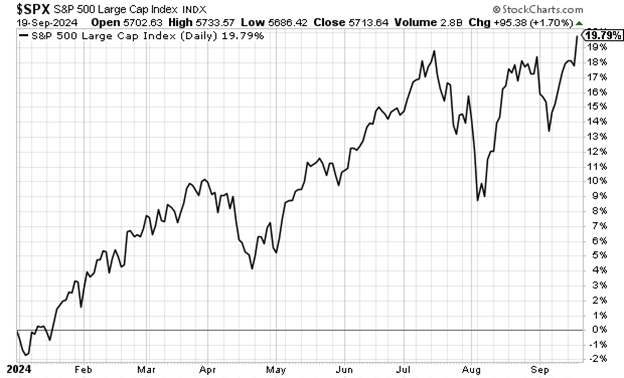
America has always been a land of optimists.
Pioneers didn’t come over here because life would be easier. They came believing that with hard work and faith they could ultimately make their lives better.
One of the foundational ideas behind the American Dream is that hard work and a little luck can enable anyone to improve their station in life.
Internationally, we’re seen as positive people.
One European friend noted to me once that not only do Americans say things like “awesome” frequently … but they actually mean it.
But it has been difficult to feel positive this year.
We are still living in what we call the Age of Chaos.
If you’re new to the Digest, the Age of Chaos is the idea that faster-than-ever exponential technical progress (e.g., artificial intelligence), government policies that create inflation, volatility, and currency debasement, plus the huge changes brought about by the end of globalization have completely turbocharged the rate of change we are seeing in the world.
Industries are sprouting up overnight, while others are being destroyed at rapid rates.
And all that means huge winners and major losers are being created faster than at any time in human history.
This is the heart of the Age of Chaos.
We write about this theme often because it is a huge part of the macroeconomic environment investors live in.
This year has felt especially chaotic due to the hotly contested election.
But no one should confuse acknowledging the crazy environment we live in for pessimism.
In fact, we feel just the opposite. And you should too.
Hope you haven’t missed the rally
This week the Federal Reserve gave investors a jumbo rate cut and removed a great unknown that was hanging over the market for most of the year.
(By the way, kudos to my Digest colleague Jeff Remsburg who told everyone to bet on a 50-basis-point cut the day before the meeting.)
So much anticipation was built around this Fed meeting. So many articles and essays written, so many interviews with and statements from talking heads about what the Fed should’ve done, should do, and will do going forward.
Frankly, after this last meeting, everyone should just take a deep breath.
We are now clearly in a rate cutting cycle.
But even before the Fed decision, this year has been great for investors.
Despite what feels like living in a constant state of disruption, the S&P has returned more than 19% year to date.
Given that the S&P’s average return over the last 30 years is around 10%, this year would be a standout!
War in Europe and the Middle East didn’t stop it.
The most contentious and controversial presidential race in our country’s history didn’t stop it.
And high interest rates sure as heck didn’t stop it.
The actual election outcome in November remains a big question mark, but despite the hyperbole spouted by media stars looking for big ratings, the market tends to do just as well (or poorly) under Democratic or Republican administrations.
Financial advisory firm Edward Jones published a piece earlier this year noting that fact.
Despite the temptation to tie market outcomes to election results, stocks have performed well under both Republican (R) and Democratic (D) presidents. The strongest returns occurred during the F. Roosevelt (D), Clinton (D), Eisenhower (R) and Reagan (R) presidencies.
Since 1930, there have been 23 U.S. presidential elections, with Democratic candidates winning 13 times and Republicans prevailing the remaining 10. The average annualized price return (excluding dividends) of the S&P 500 was 9.6% when a Democrat won and 5.7% when a Republican won. But when looking at longer-term horizons, such as 10 years post-election, results for both parties are similar, with the S&P 500 returning around 7%.
The truth is that big picture economics have a lot more to do with stock market performance than who sleeps in the White House. Sure, policy can affect the economy, but big stories like the Age of Chaos are going to continue regardless of who wins in November.
And it’s easy to get carried away by the crazy pace of change.
It’s easy to understand why people can view all this change and want to do nothing but stick their dollars in a money market fund and feel safer.
But you’d have missed 19% to the upside so far this year.
And maybe you could have done even better if you didn’t let your emotions affect your investing.
How to maximize your returns
We’ve written before about the critical importance of not letting your emotions affect your investing. The human brain is a marvelous thing that has created amazing art and inventions.
But it’s not the best tool for investing decisions.
Next week, macro investing expert Eric Fry is going to have an exclusive event to help investors get the most from their portfolios.
Here he is describing the ideas behind the event.
Imagine you get in your car and head to the supermarket. But after you get on the road and pick up speed, you go into a panic…
You just noticed there’s no brake pedal. You have no ability to stop or slow the vehicle.That’s a recipe for disaster.
You’d never choose this scenario, right? That’d be crazy.
But believe it or not, this is evocative of how most people manage their investment portfolios. They get into investments with a destination in mind… but no plan for what to do if things don’t go as expected.
Then, when things don’t go their way, they panic and let emotions guide their decision making. Instead of simply letting off the gas and slowing to a stop, they’re taking their chances with the ol’ tuck-and-roll maneuver.
You see, the decision to enter an investment or trade is just Step 1. I daresay that’s the easy part. The step that comes after, however, is more important. Trade management can draw the line between whether you come to a safe halt or something far more grisly…
During the event, Eric is going to talk about why investors need to revise the way they invest. Why they need to put the power of technology on their side.
The reality is that many fail to maximize gains on their stocks, simply because they allow their emotions to get in the way. That kind of investing could become very costly in the months ahead.
The Age of Chaos has led many people to let their emotions govern their investing choices. Maybe it kept you out of the market and you missed a 19% gain. Or maybe you’ve let winners run too long and let profits bleed away. Or you got spook by the political climate and got out early on a pick that has gone on to more gains.
There is a way to emerge in a stronger financial position than you are today.
Eric is going to tell you all about it on Tuesday, September 24th at 8 p.m. at The Great 2024 Sell-Off event. He is going to reveal one of the most critical trade management tools available to any investor.
You can click here to reserve your spot for this free event.
There is a lot of fear talk right now, even as the market has experienced better than average gains.
Rather than let your emotions affect your portfolio, you can join Eric next Tuesday at The Great 2024 Sell-Off and learn how easy it is to use technology to maximize results.
Enjoy your weekend,
Luis Hernandez
Editor in Chief, InvestorPlace





